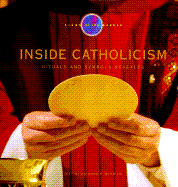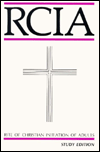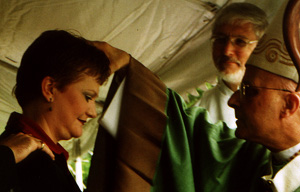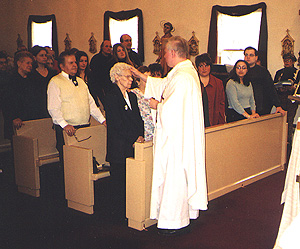Confirmation
Baptism is immersion, submersion, or pouring of water, making a child or adult a Christian and a member of the Church. The second sacrament of initiation is confirmation, anointing with oil, blest by the bishop. The third and most important sacrament of initiation is first Holy Communion, the Eucharist.
It is important to note that confirmation is not a sacrament of maturity and in no way corresponds to pagan or Jewish rites of passage. It is simply the anointing after baptism, preparing the child or adult to receive Holy Communion afterwards.
In the United States, some children are given confirmation after First Holy Communion, reversing the proper order of the sacraments and causing confusion. For example, because of this twentieth century disorder, some people think that confirmation is somehow more important than Communion or that it requires some greater commitment or some greater maturity. None of this is found in any document of the Church, nor in its tradition.
 Some religious education programs demand more of children preparing for confirmation than they demand for first Holy Communion.
Some programs also provide information on the history and theology of
confirmation; then, instructors wonder why some of these
children don't continue going to Sunday Mass after they receive
confirmation. What is important in confirmation preparation is
instruction on the meaning and importance of Sunday Mass; that's what confirmation is leading to. So, the focus in confirmation classes should be the meaning of the Eucharist and the nature of the Church. People need to study the history and theology of the Mass and learn to appreciate it. That's what is critical and necessary.
Some religious education programs demand more of children preparing for confirmation than they demand for first Holy Communion.
Some programs also provide information on the history and theology of
confirmation; then, instructors wonder why some of these
children don't continue going to Sunday Mass after they receive
confirmation. What is important in confirmation preparation is
instruction on the meaning and importance of Sunday Mass; that's what confirmation is leading to. So, the focus in confirmation classes should be the meaning of the Eucharist and the nature of the Church. People need to study the history and theology of the Mass and learn to appreciate it. That's what is critical and necessary.
Full initation in the Church is given by the reception of first Holy Communion. You can't be initiated any further by the sacraments. If you receive Holy Communion, you are a full member of the Church. In general, Protestants cannot receive Communion in a Catholic Church precisely because they are not fully in communion with us. Sharing Holy Communion is the strongest, most powerful symbol we have of common faith, hope, and love; it is also a symbol that makes the reality present. It is a sacrament.
 With adults, we are required to give the three sacraments of initiation in their proper order: baptism first, then confirmation,
then the Eucharist. With children, many bishops and pastors are
arranging to have both confirmation and first Holy Communion in the same
celebration, when the bishop comes. As this trend continues,
there will be more and more accurate understanding of the genuine
tradition of Christian initiation.
With adults, we are required to give the three sacraments of initiation in their proper order: baptism first, then confirmation,
then the Eucharist. With children, many bishops and pastors are
arranging to have both confirmation and first Holy Communion in the same
celebration, when the bishop comes. As this trend continues,
there will be more and more accurate understanding of the genuine
tradition of Christian initiation.
At San Rocco Oratory, children went to local CCD classes at other Catholic churches, for example, St. Kieran's in Chicago Heights, Illinois, St. John's in St. John, Indiana, and St. Liborius in Steger, Illinois. In these parishes, separately, they were prepared for their first Holy Communion and their full membership in the Catholic Church. In 2004, at the parents' request all the children, from three different dioceses, gathered with their parents at 9 a.m. Sunday morning, to prepare for their initiation, with confirmation and First Communion together.





 top
top